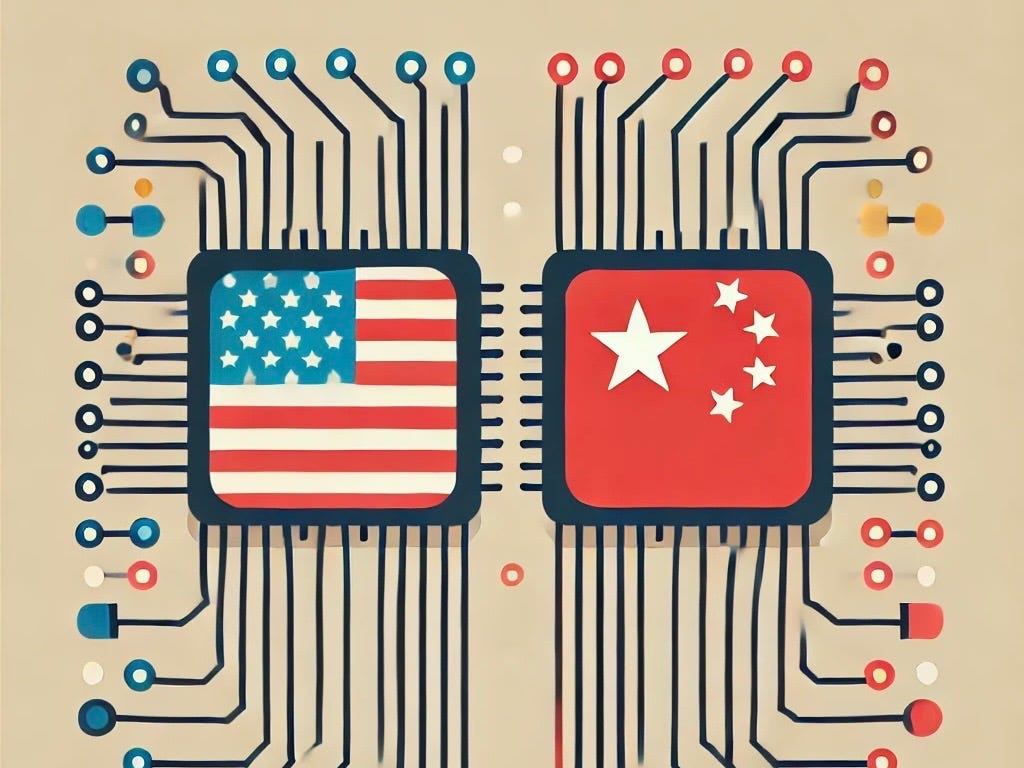China Is Advancing in AI Despite U.S. Chip Restrictions
Does the U.S. need to rethink its strategy?
In October 2022, a month before ChatGPT’s debut, the Biden administration unveiled new laws that aimed to cut China off from the best semiconductors. Without cutting-edge computer chips, Beijing’s goal of AI supremacy by 2030 appeared increasingly out of reach. At stake was more than national prestige: AI leadership could shape the global balance of power by boosting economic productivity, providing military advantages, or even a new source of soft power.
But fast forward to today, and a flurry of impressive Chinese releases suggests the U.S.’s AI lead has shrunk. It caught the attention of Eric Schmidt, Google’s former CEO and one of the most influential voices on U.S. AI policy. In May 2024, Schmidt had confidently asserted that the U.S. maintained a two-to-three year lead in AI, “which is an eternity in my books.” Yet by November, in a talk at the Harvard Kennedy School, Schmidt had changed his tune. He cited the advances from Alibaba, and Tencent as evidence that China was closing the gap. “This is shocking to me,” he
So, what changed? How did Chinese companies manage to close such a significant gap despite America's iron grip on the semiconductor supply chain? And most importantly – does it mean U.S. government's strategy to contain China's AI ambitions through export controls is unraveling?
I spoke with experts on the governance of chips, U.S.-China relations, and more try to make sense of what’s going on. You can read about it in my latest story for TIME.
Things I’ve read
Why AI Progress Is Increasingly Invisible
GARRISON LOVELY, TIME
I fear that the gap between AI's public face and its true capabilities is widening. While consumers see chatbots that still can't count the letters in "strawberry," researchers are documenting systems that can match PhD-level expertise and engage in sophisticated deception. This growing disconnect makes it harder for the public and policymakers to gauge AI's real progress—progress they'll need to understand to govern it appropriately. The risk isn't that AI development has stalled; it's that we're losing our ability to track where it's headed.
How Israel Uses AI in Gaza—And What It Might Mean for the Future of Warfare
YASMEEN SERHAN, TIME
Experts on the laws of war, already alarmed by the emergence of AI in military settings, say they are concerned that its use in Gaza, as well as in Ukraine, may be establishing dangerous new norms that could become permanent if not challenged.
It may seem unlikely that any government would find an incentive to introduce restrictions that also curtail its own military’s advancements in the process. “We’ve done it before,” counters Alexi Drew, a Technology Policy Adviser at the ICRC, pointing to treaties on disarmament, cluster munitions, and landmines. “Of course, it’s a very complex challenge to achieve, but it’s not impossible.”
New Research Shows AI Strategically Lying
BILLY PERRIGO, TIME
For years, computer scientists have worried that advanced artificial intelligence might be difficult to control. A smart enough AI might pretend to comply with the constraints placed upon it by its human creators, only to reveal its dangerous capabilities at a later point.
Until this month, these worries have been purely theoretical. Some academics have even dismissed them as science fiction. But a new paper, shared exclusively with TIME ahead of its publication on Wednesday, offers some of the first evidence that today’s AIs are capable of this type of deceit. The paper, which describes experiments jointly carried out by the AI company Anthropic and the nonprofit Redwood Research, shows a version of Anthropic’s model, Claude, strategically misleading its creators during the training process in order to avoid being modified.
Tarbell Fellowship applications open
Calling aspiring tech-journalists! About a year ago, I was awarded the Tarbell Fellowship, a program that provides early-to-mid -career journalists interested in covering AI. My cohort was provided with intense training, financial support, and a placement at a major newsroom (in my case, TIME). It’s cliche to write, but it’s no exaggeration to say that it changed my life.
The five-round application process is grueling, and it is competitive (I was rejected the first year I applied). But it is 100% worth the effort.
Tarbell is hosting virtual information session Wednesday, January 15th, (6pm GMT/1pm ET/10am PT). If you are considering applying, please attend one. If you still have questions, email me personally at contactharrybooth[at]gmail.com.
You can learn more here.




